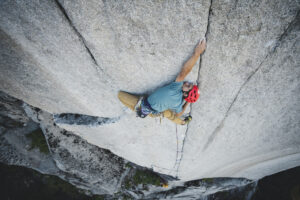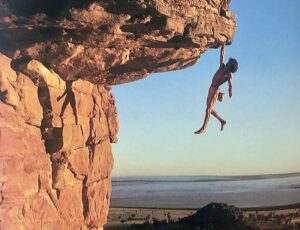Climb to get records and capture fame, or climb because nature inspires you?
It’s a perceived dichotomy that’s been known to rot relationships and pit athletes against each other. And from the very first seconds of Enchainment, you think Alastair McDowell is about to walk right into the trap.
“Ticking off lists of summits was never what motivated me, going into the mountains,” McDowell says in voiceover. “It seemed so arbitrary and consumeristic. I was drawn into the mountains for the wild places, the technical challenges, traversing the landscape; to experience true remoteness. But then one night, I met [New Zealand mountaineer] Penny Webster, and she gave me an idea.”

Photo: Enchainment
A human-powered challenge
The next thing you expect him to say, based on the documentary’s thrust, is “do an arbitrary stunt for consumeristic purposes.”
The thrust of Enchainment: climb every 3,000m peak in New Zealand in a single push, without riding in cars or other mechanized transportation.
It would seem “true remoteness” would have to fly out the window for McDowell and his partner, Hamish Fleming.
Yes, the objective commands merit in and of itself — 23 mountains clustered inside and around a pristine national park, and one other that’s perched hundreds of kilometers away. Steep ice, deep snow, big wall climbing, and tireless road biking. Promises of dicey weather.
Webster and other New Zealand climbing icons make appearances and explain the challenges. And the scenery doesn’t fail to excite.
But the finished product is a stylized and dramatic film in the vein of what we’ve come to expect from climbing publicists.

Photo: Enchainment
Meaning and meaninglessness
In short, the men don’t exactly prove there’s a middle ground (at least not to me). But they do vacillate pleasingly between two hazards of the human condition we’ve all battled with: meaning and meaninglessness.
The trip is not a classic hard-person tale where explorers persevere against dire odds with grit and guts. And, happily, it doesn’t pretend to be. When storms lash the peaks, McDowell and Fleming recline in cozy mountain huts and make tea. Meaning, or the performance of it, intrudes: “You can’t force your ambitions onto these mountains.”

Photo: Enchainment
But that happens mid-outing. By the end of the film, they’re scrambling to complete their self-assigned circuit in the self-allotted time. And their determination to meet this “arbitrary” objective fractures their sagacious fiber.
Late in the action, the team pedals road bikes toward the 24th peak alongside a station wagon. Against an overstrung, melodramatic soundtrack, McDowell says “everything looks so dubious — what’s it going to be like if we get up there and it’s just totally quagged in?”

Photo: Enchainment
The possibility that they do what a normal mountaineer would do — wait for fairer weather — is gone.
“This sort of tension was building and we could feel it. We discussed all these ideas around the prospect of failure, and what would that actually be? If we didn’t get up one of the peaks? We’d still succeeded, surely, but we hadn’t done our mission,” Fleming frets.
So what is success without a mission?
If humans can feel true inner value, Fleming and McDowell find themselves in a familiarly puzzled state over it.
If we can only simulate this value by jumping through hoops we create ourselves, well, that game amounts to little sum. Enchainment doesn’t break the feedback loop, but it’s worth a watch as a disquieted case study within it.






